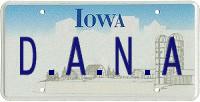  |
|
|||||||||||||||||||
|
||||||||||||||||||||
| ||||||||||||||||||||||||
|
From: Moore, Debra [AG] [mailto:DMOORE@ag.state.ia.us] February 5-11, 2006
National
Consumer Protection Week “Grand Scam Challenge” and other Consumer-education games on-line at www.consumer.gov/ncpw Here’s an idea on how to observe National Consumer Protection Week Feb. 5-11: Iowa Attorney General Tom Miller invites everyone to take the “Grand Scam Challenge” – a set of on-line consumer-education games and quizzes. “Just go to www.consumer.gov/ncpw,” Miller said. “You will find a dozen on-line quizzes and games that give good consumer-education tips on everything from identity theft and scholarship scams to on-line shopping and telemarketing.” National Consumer Protection Week is organized every year by state and federal agencies and others, including the state attorney generals, the Federal Trade Commission, the Federal Communications Commission, the U.S. Postal Inspection Service, AARP, and the BBB. This year’s theme is “Consumer Protection: It’s the Name of the Game.” “These on-line games and quizzes are quick, easy, fun, and educational,” Miller said. “They are good for students, older Iowans, and everyone in between.” The “Grand Scam Challenge” games are a great educational tool for teachers to use in classrooms. Go to and click on “National Consumer Protection Week” for games including “Spot that Scam,” “Discount Dynamo,” “Giveaway Guru,” and “Identity Idol.” Click on “consumer information” for more quizzes and games. Miller also listed several cardinal rules for smart consumers: * Be skeptical. Remember: “If it sounds too good to be true, it probably isn’t true!” * Ask questions, shop around, study offers, get information in writing, keep receipts. * If you have a problem, raise it with the seller – insist on your rights. * If you can’t resolve your problem, contact the Consumer Protection Division. For more information, or to file a complaint, contact the Consumer Protection Division on-line at www.IowaAttorneyGeneral.org (click on “protecting consumers.”) Call 515-281-5926, or call toll-free at 1-888-777-4590. Write to the Attorney General’s Consumer Protection Division, 1305 East Walnut St., Des Moines, Iowa 50319. CONSUMER ADVISORY February 2006 By Attorney General Tom Miller
Get Your FREE Credit
Reports You are entitled to a FREE copy of the credit reports compiled by the three national credit reporting bureaus. You can get one free copy from each company every twelve months. It’s easy, and it’s important -- you can catch errors, and detect identity theft. The credit reporting companies collect information about you -- important information such as if you pay your bills on time, how much you owe, and whether you’ve filed for bankruptcy or been sued or arrested. The companies sell your information to creditors, insurers, employers, landlords, and other businesses who want to evaluate your credit. The three national credit reporting agencies are Equifax, Experian, and Trans Union. The FTC required them to create a joint clearinghouse for consumer requests, so it’s very easy: Just go to GOTOBUTTON BM_1_ www.AnnualCreditReport.com. Or call toll-free to 1-877-322-8228. Or write to P.O. Box 105281, Atlanta, GA 30348-5281. You can order all three reports at once, or you can get them one at a time every four months or so. Why should you obtain and examine your credit report? First of all, it is yours, and you probably should see what lenders and others are reading about you. C Check your credit reports to see if there are any errors -- and then get them corrected. Millions of credit reports are sold every day, and research shows about one in four credit reports contains an error. Errors might cause you to pay higher interest rates, or be denied a home loan, credit card, or even a new job. Federal law and FTC rules give you very specific rights to dispute and correct your credit reports. C Review your credit reports to be sure no one has stolen your identity. “Identity theft” usually means someone uses your personal information to open new accounts under your name without you knowing it. Examine your reports, and look for unfamiliar credit card accounts or other suspicious activity, such as incorrect addresses or indications of delinquent payments. So, go to GOTOBUTTON BM_2_ www.AnnualCreditReport.com Or go to GOTOBUTTON BM_3_ www.FTC.gov (the Federal Trade GOTOBUTTON BM_4_ Commission web site) GOTOBUTTON BM_5_ for even more information on how, why, where and when to get your free credit report, how to dispute errors, and what to do if you are a victim of identity theft. You also can get to this information by going to GOTOBUTTON BM_6_ www.IowaAttorneyGeneral.org If you have complaints or questions, call us at 515-281-5926 or toll-free at 1-888-777-4590. Or write to the Attorney General’s Consumer Protection Division, Des Moines, Iowa 50319. Consumer Protection Division ! Hoover Building ! Des Moines, Iowa 50319 ! 515/281-5926
December 2005 By Attorney General Tom MillerConsumer Tips for Holiday Shoppers The holiday shopping season is by far the busiest time of year for most shoppers and retail stores -- and the season also generates more than its share of consumer problems. Why? Most likely because of the sheer volume of purchases, because many consumers are in a rush, and because people later will want to make more gift returns and exchanges than during other seasons. It’s an important time to be a smart shopper. How to avoid consumer problems: Buying Online: Be sure to shop with reputable companies. Make sure the seller lists an address or toll-free number just in case you have a problem. Be sure purchases are refundable in case you are not satisfied. Get all details on shipping and handling fees, refund and return policies, and complaint procedures. Print out and keep records of your purchase. Use only “secure” web sites. Pay by credit card (not by check) so you can dispute the bill and withhold payment if necessary. For more tips on “Web” shopping, go to: GOTOBUTTON BM_1_ www.IowaAttorneyGeneral.org (click on “consumer protection”), or GOTOBUTTON BM_2_ www.FTC.gov . Returns and "layaways": Make sure you know a store's policy on returns or layaways before you make a purchase. Remember, there is no state law that requires stores to give a refund, exchange, or credit for merchandise that is returned or taken off layaway (unless the store advertises that it accepts such returns, or unless an article is defective or was misrepresented.) Remember, Iowa's three-day-right-to-cancel law only applies to door-to-door sales, or sales made away from a seller's usual place of business. In short, most refund policies are up to individual retailers. Always keep receipts. Most stores will not make refunds without them. Mail orders: If you order gifts by mail or telephone or over the Internet, you have certain protections. Federal law requires the seller to ship your purchase within thirty days, unless the offer or advertisement specifies a later date. If there is a delay, the seller must notify you, give you a chance to cancel your order, and send a full refund if you choose to cancel. The safest way to pay for mail order purchases is by credit card. Gift Certificates: If you're thinking of buying a gift certificate, check the store's policy. Find out if the store will give a credit or cash return if the purchase price is less than the value of the gift certificate, and any other terms the store places on the certificates. GOTOBUTTON BM_3_ GOTOBUTTON BM_4_ To file a complaint or get more information, contact the Consumer Protection Division, Hoover Bldg., Des Moines, IA 50319. Call 515-281-5926, or toll-free at 1-888-777-4590. On the web: GOTOBUTTON BM_5_ www.IowaAttorneyGeneral.org . Have a wonderful holiday season.
Consumer Protection Division ! Hoover Building ! Des Moines, Iowa 50319 ! 515/281-5926
CONSUMER
ADVISORY August
2005
By Attorney General Tom Miller
Tips
for Buying a Used Car
The Attorney General’s Consumer Protection Division receives hundreds
of calls and consumer complaints every year about used car purchases.
Follow these tips to avoid unexpected expense and disappointment:
Shop around.
Do
your research. Take your time. ·
Check out the
values of several makes and models in your price range.
Most public libraries have vehicle value guide books available at no
charge to look up prices, such as the Kelley Blue Book or the NADA Used Car
Price Guide. ·
Check with your
bank, credit union or other lender whether you qualify for a loan, and how much
you can get. Remember, you may get
a better used-car loan rate from
your financial institution than from a dealer. When you find a car you like, take
your time, ask questions, and check it out. ·
Test-drive the
vehicle, and take it to your mechanic for inspection.
Never buy a car without test-driving it first, and never buy a car from
someone who won’t let you take it to a mechanic for a pre-sale inspection. ·
Research the
car’s history. For a fee, private
services like Carfax and Autocheck may be able to tell you whether the vehicle
has ever been titled as salvage, flood-damaged, or rebuilt, or if it has ever
had an odometer mileage discrepancy. ·
Check out the
repair history for the make and model. The
spring auto issue of Consumer Reports magazine lists repair histories for
various used-car makes and models. The Internet also has a great deal of information about used
cars. ·
Check the
paperwork on the car before signing a contract to purchase.
Examine the odometer and damage disclosure statements.
·
Offer a fair
price, and focus on the total purchase price. (If you focus only on the monthly payment amount, you may end
up paying more than the car is worth.)
Watch what you sign -- once you sign a contract to buy, there generally
is no three-day right to cancel. Put any
disputes or other important issues in writing.
Be ready to walk away if you aren’t satisfied with a deal.
Be comfortable with your purchase.
To check out a dealer’s complaint record, call the Attorney General’s
Consumer Protection Division at 515-281-5926 or 888-777-4590 (toll-free). Consumer
Protection Division ! Hoover Building ! Des
Moines, Iowa 50319 ! 515/281-5926
|